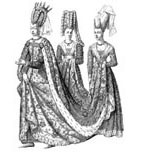
Are There Male & Female Virtues?
A MARRIAGE OF NATURE & NECESSITY
“Woman’s virtue,” actress Cornelia Otis Skinner once quipped, “is man’s greatest invention.” Her wry reflection raises an increasingly pertinent question concerning gender-oriented virtues in modern society. The ascendency of equality as a pre-eminent Western value, coupled with feminist critiques of gender roles as social constructs, has cast doubt upon the assumptions about virtue shared by all previous generations. Are there male and female virtues? Are perceived gender-based virtues mere societal contrivances perpetuating anachronistic gender stereotypes, or are they essential components of civilization that arise from human nature?
Virtue must be distinguished from social custom (though this too is deeply gender-conscious) and morality. St. Augustine defined virtue as “a good habit consonant with our nature,” and St. Thomas Aquinas distilled the definition to habitus operativus bonus, a good operative habit. A virtue should thus be understood as a well-cultivated disposition of the will which, in accordance with reason, immediately conforms our actions to morality. If morality is therefore understood as the universal and antecedent principle of good by which virtuous behavior is measured, social customs ought to be recognized as the traditional, cultural mores that lend to the cultivation of virtuous behavior.
A cursory glance at civilizations old and new confirms that the predominant exercise of some virtues has always been appointed to men, and others to women. To men, for example, is entrusted the virtue of courage. Manliness (Latin: vir) is, in fact, the etymological root of the word courage (Latin: virtus) and, by extension, the word virtue. Also known as fortitude, courage is one of the four cardinal virtues identified in classical Greek philosophy and adopted by the Church. Aristotle defined courage as a “golden mean” (i.e., the happy medium) between cowardice and foolhardiness. As a result of this delegation of virtuous responsibility, men have a duty of bravery. For example, a man who would abandon a woman in his company to aggressors would justly be condemned for his cowardice.
Conversely, a woman would suffer no indictment were she to flee her masculine company at the outset of violence. Women are not charged with exhibiting courage in such circumstances, and so are expected to seek safety — just as men are expected to secure their escape. This is not to imply that women are never called upon by society to be courageous — especially in connection with duties of a particularly feminine attachment, such as the protection of children — but bravery is the particular purview of men and has been delegated by society to their care. It follows that a well-ordered society requires men to exemplify fortitude at the risk of their lives, whereas women are encouraged to retreat from peril.
You May Also Enjoy
Today, transgenderism is firmly established in the cultural landscape. Who will cut through the cant, expose the cultural masquerade, and proclaim the truth? Our religious leaders?
The most prudent means by which to safeguard society is a partial delegation of virtuous labor in accordance with the inherent capacities of its members.
Courage, or fortitude, is the cornerstone of the four cardinal virtues, and it is the element that seems to be missing in the modern "virtues."

